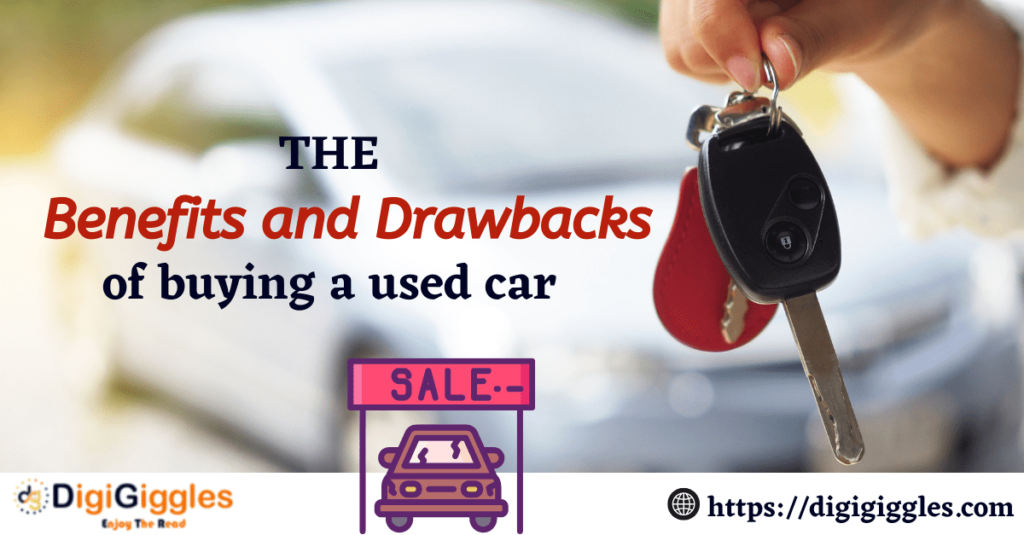Introduction
When it comes to purchasing a car one of the primary decisions you’ll face is whether to buy new or used. While a brand-new car might have its appeal there are numerous advantages to buying a used car that shouldn’t be overlooked. In this blog post, we will explore the benefits and drawbacks of buying a used car enabling you to make an informed decision that suits your needs and budget.
Benefits of Buying a used car
- Cost savings: One of the most significant advantages of purchasing a used car is the cost savings. Used cars are generally more affordable compared to their new counterparts. You can save a significant amount of money by buying a used car especially if you opt for a model that is a few years old. Additionally used cars typically have lower insurance costs and may incur lower registration fees.
- Depreciation: New cars depreciate rapidly during the first few years of ownership. By purchasing a used car you avoid the steepest part of the depreciation curve. Used cars have already experienced their most substantial decline in value allowing you to get more value for your money. If you choose to sell the car later you’ll likely experience less depreciation as well.
- Wider variety and better features: Buying a used car opens up a broader range of options compared to buying a new one. You can explore different makes, models, and years within your budget. Additionally, you may be able to afford a used car with more advanced features and options that would be expensive in a new car. This way you can enjoy a higher trim level or additional upgrades without breaking the bank.
- Lower insurance premiums: Insurance premiums for used cars are typically lower than those for new cars. The value of a used car is generally lower, resulting in lower insurance costs. Additionally, used cars may not require collision or comprehensive coverage, further reducing insurance expenses. You can consult with insurance providers to determine the exact savings you can expect.
Drawbacks of Buying a used car
- Uncertain vehicle history: One of the main drawbacks of buying a used car is the uncertainty surrounding its history. Unlike a new car, a used car may have been involved in accidents, had mechanical issues, or undergone improper maintenance. It is crucial to obtain a comprehensive vehicle history report and have a trusted mechanic inspect the car before making a purchase. This will help mitigate the risk of unexpected repairs or hidden problems.
- Limited or no warranty coverage: Used cars often have limited or no warranty coverage remaining from the manufacturer. While some dealerships offer certified pre-owned programs with extended warranties, the coverage may still be less comprehensive than what you would receive with a new car. This means you may have to bear the cost of repairs and maintenance, which can add up over time.
- Higher maintenance and repair costs: Used cars, especially older ones, may require more frequent repairs and maintenance. As the car ages, components wear out and may need replacement. While modern cars are generally reliable, unexpected issues can still arise. It is essential to set aside a budget for maintenance and repairs when buying a used car.
- Outdated technology: When buying a used car, you may miss out on the latest technological advancements found in newer models. Features such as advanced safety systems, infotainment systems, or driver-assistance technologies may not be available or as advanced in older used cars. Consider your preferences and priorities to determine if having the latest technology is essential for you.
Conclusion
Buying a used car has both its benefits and drawbacks. On the positive side, purchasing a used car often comes with a lower price tag, allowing for significant savings compared to buying a new one. It also offers a wider selection of models and options within a given budget. Additionally, used cars have already undergone their initial depreciation, which means they may hold their value better over time.
On the other hand, there are drawbacks to consider, such as the potential for higher maintenance and repair costs, as well as the uncertainty surrounding the vehicle’s history and condition. It’s crucial for buyers to conduct thorough research, inspect the vehicle carefully, and obtain a reliable vehicle history report to mitigate these risks.
Ultimately, whether buying a used car is the right choice depends on individual preferences, budget constraints, and the willingness to undertake necessary due diligence. By weighing the benefits against the drawbacks and making an informed decision, buyers can find a used car that suits their needs while ensuring a satisfactory ownership experience.
